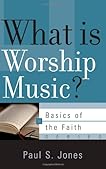 What Is Worship Music?: Basics of the Faith Series
What Is Worship Music?: Basics of the Faith Series by
Paul S. JonesMy rating:
4 of 5 starsIn this excellent and pithy little booklet, Paul Jones begins by outlining the twin problems underlying and provoking the “worship wars” of our time: A failure to study and apply the biblical principles regarding worship music, and consumerism:
“Worship music is at the center of controversy, being one of the most divisive issues in the church, as it has been for decades. Somehow we have come to define worship services almost exclusively on the basis of musical style. "Contemporary," "traditional," "blended," or "classical" worship services receive their labels from the type of music included and that music's accoutrements, which can run the gamut from liturgical robes and pipe organs to flip-flops and digital drum sets. While legitimate differences exist in the music of various people groups, the postmodern church has tended toward "pop" culture as its pragmatic answer for music, and toward youth pop culture in particular. I fear that this is an enormous mistake. We need to be following biblical principles for worship music, not the world, youth culture, or ideas based on mistaken notions of success.
In some places, biblical worship principles are entirely ignored; in many others, they have not been thoroughly explored...”
“Consumerism tells us that if we are "paying" we should get what we want. So congregational factions and individuals wrestle for equal representation or dominance, to ensure that their musical desires are satisfied in the church where they are "customers," whether or not they are members. Trained church musicians are frequently forced to take liberal church posts to survive because conservative churches, by and large, do not value, hire, or support them. Amateurs end up leading worship music when and where they should not, sometimes by default, sometimes by design.
The result: church music is adrift in a sea of trends, being blown about by the wind of every opinion, regardless of how modestly informed these may be.” (pp. 5-7)
Jones then introduces the threefold structure of the booklet with yet another call to base our conclusions about worship music on what the Bible says regarding such:
“Based on biblical evidence, music properly fulfills three roles in the context of worship:
praise,
prayer, and
proclamation. Praise is the lauding of God for his acts sand attributes, acknowledging his supremacy in all things. Prayer is communication addressed to God. Proclamation encompasses any activity that proclaims the Word of God - quotation, explanation, teaching, and preaching. Praise, prayer, and proclamation are the roles of psalmody and hymnody, of vocal music and instrumental music. They extend to congregation and choir, to layperson and minister; to organist and guitarist. And when worship music is properly fulfilling these roles according to biblical principles, discord dissipates, unity increases, and the Spirit utilizes music for its highest purpose, for man's chief purpose - to glorify the triune God.
For our worship music to be biblical, it must find its themes, principles, and qualities in Scripture. Careful consideration and implementation of what God has revealed will correct aberrations in practice. This short volume seeks to interact with biblical evidence concerning music in order to arrive at biblical principles for the local church.” (pg. 7)
If Jones is right, and “church music is adrift in a sea of trends, being blown about by the wind of every opinion, regardless of how modestly informed these may be” then this little booklet is a good start towards getting church music
anchored once more in the truth of God’s Word.
View all my reviews >>

 What Is Worship Music?: Basics of the Faith Series by Paul S. Jones
What Is Worship Music?: Basics of the Faith Series by Paul S. Jones Last Call: The Rise and Fall of Prohibition by Daniel Okrent
Last Call: The Rise and Fall of Prohibition by Daniel Okrent







